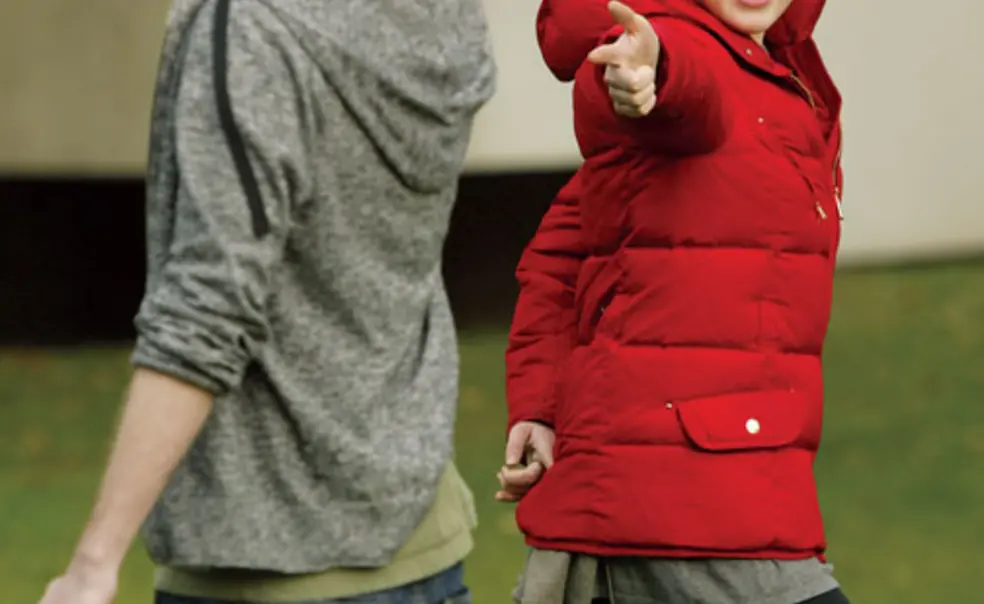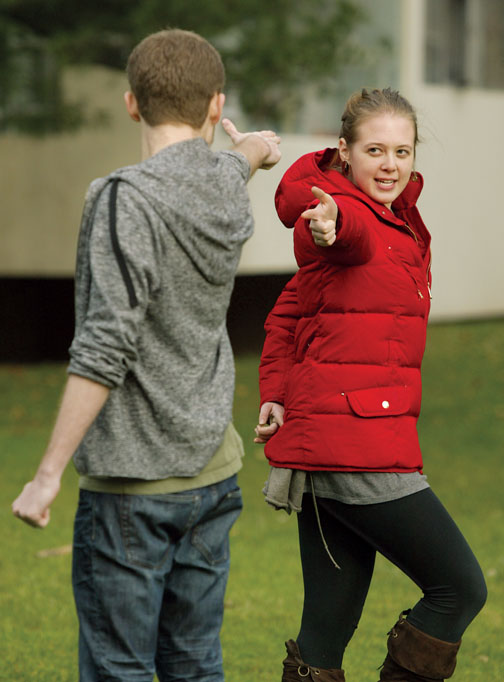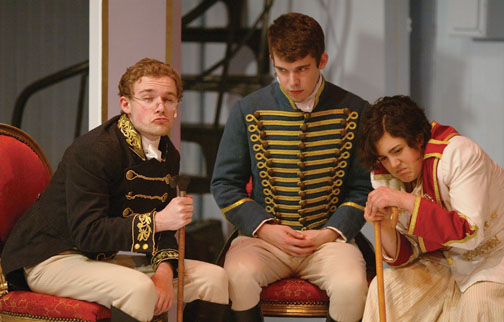Bringing ‘Onegin’ to life, in class and on stage
Alexander Pushkin is regarded by many Russians as the country’s greatest poet. Even today, nearly 200 years after he lived, educated Russians know many of his poems — including stanzas from his novel-in-verse, Eugene Onegin — by heart.
The complexity of Pushkin’s work has made translation difficult, so unlike his fellow countrymen Dostoyevsky and Tolstoy, Pushkin is unfamiliar to most English speakers. But 18 students have plunged into the world of Onegin, spending the fall semester studying the poem, a play adaptation that never had been performed, and the complicated history of both before beginning rehearsals for the world premiere of the dramatic version, staged on campus last month.
The play tells the story of Eugene Onegin, a cynical young aristocrat who becomes the love object of the reserved but passionate Tatyana when they meet at a dinner party. To fully understand the play’s milieu — upperclass Russia in the 1820s — the students engaged in dueling, ballroom dancing, letter-writing, and gambling; ate kasha and zavitushki (almond rolls); did needlework; acted out folk plays; and experimented with divination, forecasting the future through supernatural powers. Many of these elements are featured in the play, a moody story of love mired in gossip and the confines of social conventions.
“Even in professional theater, you never have more than a week for tablework,” during which the actors study the play’s background and time period, said theater professor Tim Vasen, who co-taught the class, “Pushkin’s Eugene Onegin,” and directed the play. “The students have immersed themselves in this world.” Their deep understanding of the material will create a richer performance, Vasen said.
“I know more now about all of the other characters on stage than I have in any other production,” said Sarah Bluher ’13, a geosciences major who loves theater. Bluher was one of 15 undergraduates and three graduate students in Vasen’s class, all of whom were cast in the play. Several also helped to design the costumes, dancing, lighting, and sets.
The class probed the complex history of Onegin: It was set to be staged as a play for the first time in 1936, on the centennial of Pushkin’s death, when the production abruptly was canceled under pressure from Stalin’s Soviet regime. Music for the play came from legendary composer Sergei Prokofiev. The play’s script, lost for decades, was discovered in a Moscow archive in 2007 by Princeton music professor Simon Morrison *97, and was reunited with its music for the performance at Princeton.
Morrison previously brought world premieres of lost Russian theater projects Le Pas D’Acier and Boris Godunov to Princeton. He worked with Professor of Slavic Languages and Literatures Caryl Emerson, who helped translate the Onegin script. Two versions of Onegin were performed in February — the version Vasen directed, with a bare-bones orchestra to put the focus on the words, and a “music-forward” version with 40 musicians from the Princeton Symphony Orchestra.
Some of the play’s themes — such as the danger of caring too much about social conventions — have as much relevance in the 21st century as they did in the 19th. For a class project, comparative literature major Alana Tornello ’12 studied the diaries that young Russian women filled with art and mementos and passed among friends. These “ladies’ albums” are a critical element of the play’s drama — the album that the flirtatious Olga shows to Onegin indirectly leads her beau to challenge Onegin to a duel.
To bring Olga to life for her classmates, Tornello created the 21st-century equivalent of Olga’s ladies’ album — a Facebook page. Olga’s profile says she plays the card game whist, enjoys mazurka music, and watches the TV show Desperate Housewives.














No responses yet